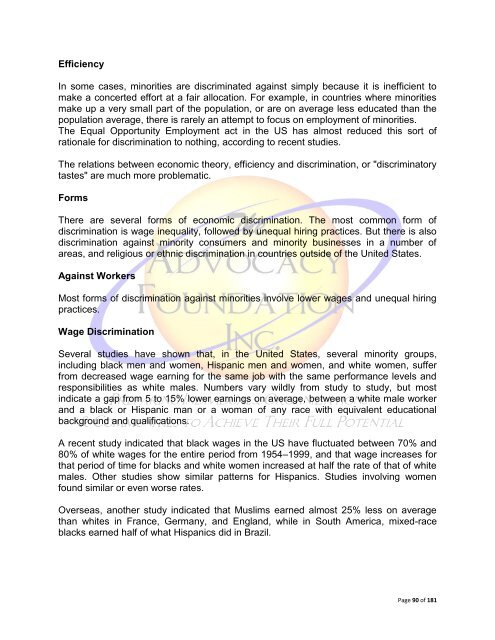You also want an ePaper? Increase the reach of your titles
YUMPU automatically turns print PDFs into web optimized ePapers that Google loves.
Efficiency<br />
In some cases, minorities are discriminated against simply because it is inefficient to<br />
make a concerted effort at a fair allocation. For example, in countries where minorities<br />
make up a very small part of the population, or are on average less educated than the<br />
population average, there is rarely an attempt to focus on employment of minorities.<br />
The Equal Opportunity Employment act in the US has almost reduced this sort of<br />
rationale for discrimination to nothing, according to recent studies.<br />
The relations between economic theory, efficiency and discrimination, or "discriminatory<br />
tastes" are much more problematic.<br />
Forms<br />
There are several forms of economic discrimination. The most common form of<br />
discrimination is wage inequality, followed by unequal hiring practices. But there is also<br />
discrimination against minority consumers and minority businesses in a number of<br />
areas, and religious or ethnic discrimination in countries outside of the United States.<br />
Against Workers<br />
Most forms of discrimination against minorities involve lower wages and unequal hiring<br />
practices.<br />
Wage Discrimination<br />
Several studies have shown that, in the United States, several minority groups,<br />
including black men and women, Hispanic men and women, and white women, suffer<br />
from decreased wage earning for the same job with the same performance levels and<br />
responsibilities as white males. Numbers vary wildly from study to study, but most<br />
indicate a gap from 5 to 15% lower earnings on average, between a white male worker<br />
and a black or Hispanic man or a woman of any race with equivalent educational<br />
background and qualifications.<br />
A recent study indicated that black wages in the US have fluctuated between 70% and<br />
80% of white wages for the entire period from 1954–1999, and that wage increases for<br />
that period of time for blacks and white women increased at half the rate of that of white<br />
males. Other studies show similar patterns for Hispanics. Studies involving women<br />
found similar or even worse rates.<br />
Overseas, another study indicated that Muslims earned almost 25% less on average<br />
than whites in France, Germany, and England, while in South America, mixed-race<br />
blacks earned half of what Hispanics did in Brazil.<br />
Page 90 of 181

















